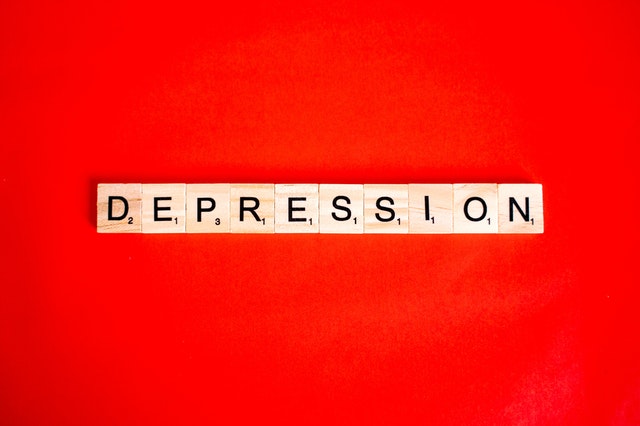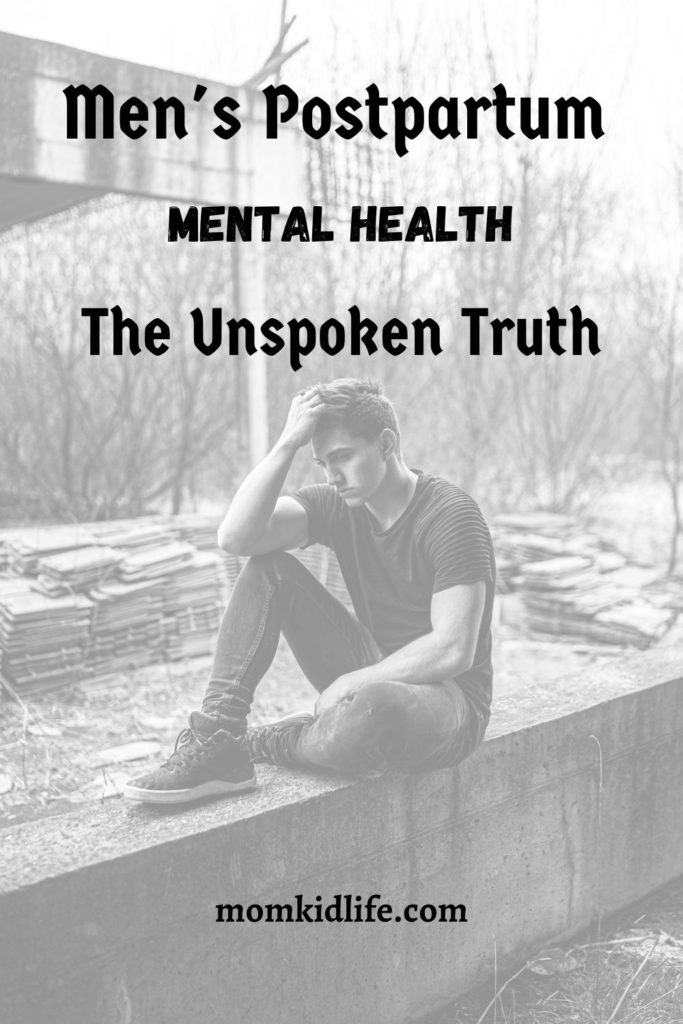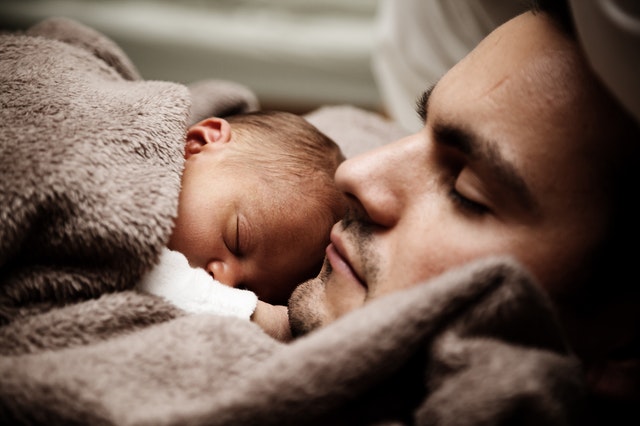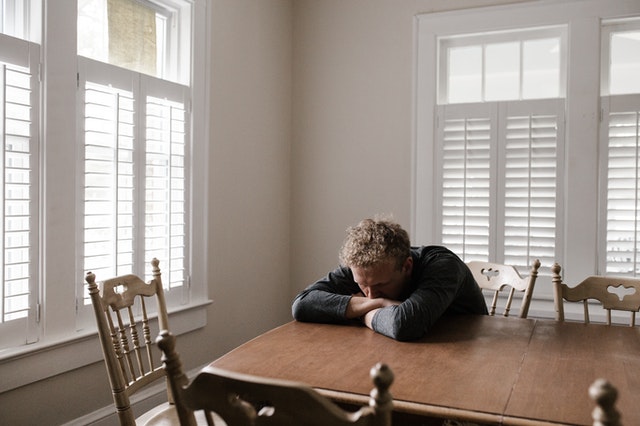Guest Post by Donna Crighton
What is PostPartum Depression?
The term ‘postpartum’ means the period immediately after birth. Postpartum depression can affect parents during this time frame and is a recognized mental health condition that can be diagnosed by doctors.
We have always been talking of Postpartum depression among new mums, but have we ever tried probing about the same condition in new dads? Being a new parent is a life-changing experience for both: New Mums & Dads. You might like to also read about a Father’s Advice on Fatherhood
“I believe the biggest stigma right now, with mental health, is that a lot of men are not talking about it”
Mauro Ranallo

This post contains affiliate links to various products. As an Amazon Associate, I earn from qualifying purchases at no extra cost to you. To find out more, you can read my disclaimer here
For as long as I remember, men have always been expected to ‘keep a brave face on’ especially when it comes to supporting their partner after they have given birth. Yes, many could argue that it has just been recently that a lot more focus has been placed on maternal mental health and rightfully so.
I too have experienced the devastating impact post-partum depression can have, but I also recall watching my husband experience stresses and roller coaster emotions after the birth of our daughter. It made me realise men can suffer too. Men’s postpartum depression is real, so let’s delve into this a little more…
In the UK alone, the National Childbirth Trust found that 1 in 3 fathers are concerned about their mental health but yet post-partum depression in males is still not recognised to the same degree as it is in females. Many hold this preconceived idea that postnatal depression is only down to hormonal changes that are present after a woman gives birth. Yes, it plays a big role but a person’s mental health history and even lifestyle can play a big role too.
Signs & Symptoms of Men’s Postpartum Depression

Regarding hormones being affected after birth, studies by Dr Andrew Mayers, a psychologist specializing in perinatal mental health at Bournemouth University, reports that there is some evidence that men’s testosterone levels reduce somewhat when they become fathers.
This acknowledgement that hormone levels play a pivotal role in father’s also experiencing a decline in mental health when they have a newborn would surely highlight the need for supporting fathers along with mothers but does it? Are the signs that noticeable in fathers who in turn feel that they need to support their family? Below I have detailed possible signs and symptoms to look out for (Credit: Mind).
The signs and symptoms of post-partum depression in males are as follows –
- Fear and confusion.
- Unable to bond with your baby
- Resenting your partner
- Resenting your baby
- Hostility to both mother and baby
- Insomnia, even when you have the chance to sleep
- Physical symptoms such as loss of appetite, weight loss, diarrhea, constipation and headaches
- Constantly feeling low and possibly suicidal
Plus, like with mothers, men can experience postnatal depression a year or longer after the baby is born. It can have an effect on their mental health and can impact both their personal and professional lives. In the UK, men only get typically two weeks of parental leave (longer in some cases) which can possibly cause men to feel guilty for leaving their baby and feeling like they have not had sufficient time to bond with their child and to create a strong family unit.
If the father is to work long hours or is required to work away from home for any length of period, they then face the added worry of the mother being at home alone with the child if there are no support networks close by.
Also, a new father may have not had a close bond with his own father nor had a good role model for one which can leave men confused and it can bring back those feelings of hurt and perhaps not feeling good enough or loved by their fathers.

Without this role model, some men may feel inadequate and lost when it comes to raising a child and feel that they ‘have to man up’ and ‘step up to the plate’ without accessing support for their feelings.
There can also be a history of abuse whether that being sexual, physical and or emotional perpetrated by their own fathers which can heavily impact a man’s mental health later in life thus causing confusion and perhaps difficulty bonding with their child. But on the contrary, it can also lead to somewhat protective over their child and lack of trust in other potential caregivers such as grandparents.
Furthermore, just like with mothers, men can be inundated with images from social media platforms and other various media that implies fathers to be strong caregivers and that they must be content with becoming a father. This can be very damaging just as much as it is an unrealistic portrayal of fatherhood.
The media and some social media users seem to miss out on the stresses of sleepless nights, nappy changes, non-stop crying etc… So, when you are viewing content that shows happy and smiling dads with their newborns, trust me when I say it is not all sunshine and rainbows!
With any mental health problem, a man can face shame and be fearful of expressing it. Men may feel they may look like a ‘bad dad’ and may fear that they aren’t involved enough. Along with that, there is the added stress of having a newborn which can put a strain on a relationship.
There is a lot of adjustments a couple must make to their lives when they become parents as before they heard the tiny patter of feet, a couple only had to focus on themselves and had a good level of independence. However, once the baby is here the focus is primarily on the baby and a couple can find it difficult to make time for one another and to share the same interests they had before.
So, what can men do if they feel left out with parenting and are feeling anxious or depressed? I would fully encourage them to speak to their partner if they can. You may find that your partner is feeling the same or has noticed that there has been a change in you. They may feel relieved that you feel the same way that they do and that you both need support with dealing with your feelings. You could then possibly discuss what you can both do so you can feel more included and also spend more time together.
Furthermore, speak to your GP. It is becoming more common for men to seek help regarding PND and doctors are now trained to diagnose this in both mothers and fathers. There are many organisations that are recognising now that it can have an impact on fathers too such as MIND and NCT who you can contact for extra support. Many talking therapies can be useful by helping you deal with your issues and finding healthy ways to cope. Most importantly, if you feel suicidal at all please speak to your GP, NHS 24 (UK based) or Samaritans.

About Donna Crigton
Donna Crighton was born in Aberdeen, Scotland where she still resides. She is 38 years old. She is a registered mental health nurse and has been for nine years. She is married & has a daughter called Matilda Rose and has documented her journey into motherhood with her premature daughter in her blog Preemie Mama Drama
She recently had a piece published in the book by the Positive Motherhood Project called
‘Meaning over Milestones: Mothers sharing beliefs, values, purpose and passion with their children’ which is available on Amazon.

Thanks for reading.
Have you expereinced any kind of depression? If you have any relatable story you would like to share , feel free to mail me at admin@momkidlife.com
You can also let me know your feedback on the blog & what you feel about any kind of depression by commenting below.





Such a good post! It’s very true that I never hear people refer to postpartum depression towards men. As you said, it’s a big change for both the new mom and the dad! Not to mention the stigma already surrounding men and mental health. Thank you for sharing this post.
Yes, I agree. Whenever we talk about postpartum, we never really think about its effects on men. Being a dad is such a big change & experience for men too. But we often neglect their mental state. I hope we think about men’s mental health too. Thanks for your feedback
This was really informative and helpful — I can be more mindful going forward of how men experience postpartum depression (which admittedly I didn’t know enough about). Thanks for sharing!
I was also unaware of this. All thanks to Guest writer Donna for bringing this to our notice. I think we as a society have to be more sensitive towards Men’s mental state during postpartum & even otherwise. Thanks for sharing your thoughts.
Excellent post. Important information and great points about how postpartum can impact not only women but men too. Thank you for sharing this post.
Pastor Natalie
Letstakeamoment.com
Thanks for your feedback
I never really thought that men could also get after birth depression although it makes perfect sense. I think I always had it in my mind as a women’s issue. This was really interesting!
So true that we also refer to postpartum depression with a women’s issue although it affects men too. Thanks for your feedback.
Wow, never knew men experience postpartum depression and its annoying when we tell men to “man up”. It’s unfair that this society does not allow men express their feelings. I’m glad you shared this for awareness.
Absolutely second your thoughts. Why ask men to ‘man up’ I think it’s time that men open up on their feelings & express their mental state more openly. I hope this post helps in creating more awareness in society as a whole. Thanks for your feedback.
Thank you all for your wonderful feedback. I feel that men’s postpartum mental health needs more of a spotlight placed on it.
Thanks, Donna for this wonderful post. You have brought forward an aspect that many are unaware of.
Thank you so much for raising this issue!
The complete change in circumstances impacts both parents & we both suffered post pregnancy with our own issues. My hubby was also looking after me during my mental health struggles, which takes it toll.
I want everyone to read this post. Such an important topic to discuss!
That is so true. It is such an important topic but often not tended to. We must be more vocal about what men go through after they become a parent. Thanks for your views & for sharing your experience 🙂
This is a great post, men’s mental health is just as important as women’s- and it’s important to discuss this topic x
Absolutely true. And more voices should be heard in this context. Thanks for your feedback.
This is really interesting and relevant.
Yes true. Relevant & need to be spoken about. Thanks for your feedback.
This is a really important post. I honestly never heard of postpartum depression in men but it is really important that it’s spoken about. Great post! xx
TBH even I had not heard it. But it’s true that even men go through mental health issues that must be addressed with an equal amount of importance.
This post illuminates a topic that is usually looked over. Men need support as well during all parents of parenting just like moms. Society does not aid in this since being macho is pushed in most settings. I think mental health care begins at a young age and with us modeling it for our children. We have to raise our boys knowing to own their feelings, ask for help when they need it, and speak up for others when they need support.
I absolutely second that thought. Men have emotions too & they can also go through depression. We need to understand their mental health as we understand the mental health of women. Thank you for such wonderful feedback.
Since the terminology “post partem” specifically refers to the physical separation of the two bodies (mother and baby) maybe we need a specific name to differentiate men’s post-natal mental health challenges. The chemistry appears to be different, which makes sense since male and female chemistry is already different. I would love to see some more research on this topic, though. This is fascinating.
I agree on that point. We must have a name more specific to a male’s mental condition after they become dads. More research on this matter is surely going to be beneficial. Appreciate your viewpoints. Thanks
This makes so much sense! It’s a huge change for both parents and both face a ton of pressure from many places. Men often feel that they need to be strong for their partner and their mental health is often overlooked. I know it was very stressful for both of us when each of our babies were born. Thank you for sharing!
Absolutely. Both mom & dad go through the pressure of taking care of the newborn while going through mental stress. But many times Men’s Mental Health is something that often goes neglected. Thanks for sharing your views, Heidi.
It’s good to know about such an experience before being a parent. Thank you for sharing!
Thanks Fransic for your feedback.
Thank you so much for pointing at that this is just as much depression as what a woman might experience post-partum. While the stressors and causes might be different, the outcome is the same: depression.
And there is so much that needs to be done so that they don’t reach this state of depression. Thank you so much for your feedback.
Had i not chanced on this, i would have never thought men have this condition. We need to throw more light on men and their mental health
Totally agree with that. We have so little information on the mental health of men especially after they become a new parents. Thank you for your feedback.
Love that you talked about this! Men having post partum depression is not talked about enough but they get just as stressed as us! Thank you for sharing
Oh yes, Amanda. This topic is not the one that is discussed quite often as it should be. Thanks for your feedback.
What a pertinent blog post. I totally support this cause, we must give men the sacred space to speak up their minds and hearts. Thanks for raising awareness of such delicate issue!
I absolutely second that. We need to create even more awareness in this regard. Thanks for your feedback.
I never associate men with postpartum depression. But you are right, the problem with men’s mental health is that no one is really talking about it. Unfortunately, It’s is still taboo, especially in the African American Community. But this was a very interesting read.
I totally appreciate your words. It is so important that we talk more about the mental health of men. Thanks for your feedback.
This makes sense to me. The effects of emotional and mental strains/ pressures are not limited to women. There may be differences in how it manifests between the sexes, but more equality exists than is acknowledged. Society, overall, needs to be better at treating individuals and not norms, stereotypes and expectations. Great topic to bring to our attention.
~ Cassie
Yes Cassie Lot needs to be still spoken on this topic. We need to focus on the mental health of men too after they become new dads.
Thanks for your feedback.